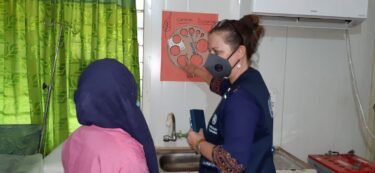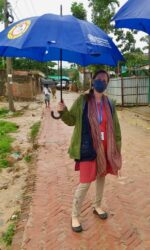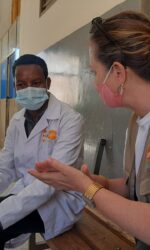Increasing maternal child health outcomes, one emergency response at a time
By Jennifer Hunt
Just before Diana Garde applied to nursing school at Seattle University, she wavered, wondering if she could do it and balance the demands of life — working, going to school, and raising her young son. A chance encounter with a woman she met at a friend’s gathering gave her the courage to start the process.
“I was telling her I want to go back to school, but I don’t know how to do it. It’s so much work and I have a child. And she said, just start the process and then soon enough you’ll be done,” Garde remembered.
Garde enrolled in nursing school and after graduating, began working at Harborview Medical Center on the trauma surgery floor and later as a sexual assault nurse examiner. It was full of learning experiences, but she soon realized she was more interested in maternal child health.
For the next 11 years, Garde worked as public health nurse for Seattle-King County Public Health in White Center, Washington. She did home visits and cared for high risk local, refugee, and migrant women and girls from low-income communities.
“This was something that felt like home to me. I felt comfortable doing the work and wanted to continue that path,” Garde recalled. So, in 2011, she began pursuing a master’s degree in nurse-midwifery at the University of Washington.
She grew interested in international midwifery and humanitarian work through inspiring conversations with , who both had international humanitarian experience.
For Garde, her advanced degree in midwifery opened opportunities to care for women in ways she wasn’t able to before. “I used my degree to provide women’s health care, including family planning, breast and cervical health and STI diagnosis and treatment. It enabled me to reach out to vulnerable adolescents through a weekly teen clinic. So, it’s different than what people traditionally would think midwives would do, but I would not have been able to do that otherwise,” she said.
Six months after graduating from UW, Garde had the opportunity to work in Sierra Leone with Partners in Health (PIH), an international nonprofit public health organization that provides healthcare in the poorest areas of developing countries.
PIH was responding to the Ebola crisis and overseeing an isolation unit in the country’s only maternity hospital. The focus on maternal health was essential given the maternal mortality rate is the highest in the world. According to Partners in Health, “A woman’s lifetime risk of dying in pregnancy or childbirth is 1 in 17.” Extreme poverty and lack of access to healthcare workers and facilities prevent women from getting the care they need in Sierra Leone. Civil war in the early 2000s and a historic Ebola outbreak only intensified the problem.
“I went to Sierra Leone and loved it,” Garde remembered. “Arriving at the airport…there were hardly any lights on, there was curfew. It was really something else. And it was very, very hard work. We were putting on the full PPE gear and going into the red zone daily.”
Because of the danger, health workers were forced to keep anyone with complications in isolation – even when it meant delivering there.
“When pregnant women are having complications, it can look like Ebola. It was hard to tease out who we should put in isolation and who could go straight to the emergency room or the operating theater,” Garde shared.
After six weeks in Sierra Leone, Garde returned to the US, but she yearned to go back to Sierra Leone and continue in the high-intensity, lifesaving work. She reached out to Partners in Health, and they offered her a one-year contract, which eventually got extended by another six months. It was just the beginning of her international nursing career.
After a brief stint back in the US as a public health nurse at a clinic in Federal Way, Washington, Garde returned to international work through Seed Global Health, an organization that trains nurses, midwives, and physicians in Malawi, Sierra Leone, Uganda, and Zambia. Garde took on more of an educator role, teaching midwifery at in Northern Uganda where health workforce shortages remain a challenge.

“It was wonderful to see a burgeoning group of male and female midwives in action. The youngest was maybe 19, and the oldest was in her forties, with quite a range of experience,” said Garde.
Garde supervised students in the field, both at a hospital during deliveries and in-home visits for postpartum care.
“We spent days in an old-style ambulance, going to peoples’ grass thatched roof houses. We checked the mom’s vital signs, made sure the baby was eating and not experiencing any complications like jaundice or weight loss, and gave the mothers medical advice. And then we’d go back every single day, for seven days. It was wonderful,” Garde shared. “I love postpartum care.”
Garde went on to Cox’s Bazaar, Bangladesh, for a year with the United Nations Population Fund (UNFPA), a sexual and reproductive health agency, overseeing United Nations volunteers and serving as a midwife supervisor to over 120 Bangladesh midwives in a refugee camp, and then almost a year and a half with the World Health Organization (WHO) as an SRH Technical Officer for the Health Cluster. It was at this point that Garde’s career shifted from clinical worker to humanitarian coordinator.

“Humanitarian coordinators oversee all the response activities for UNFPA and elaborating and coordinating with other heads of agencies or humanitarian coordinators from other agencies, like the United Nation Refugee Agency (UNHRC) and the WHO,” said Garde.
In her first humanitarian role, Garde spent six months in Tigray, Ethiopia, coordinating efforts to put women and girl friendly spaces in place to address issues with gender-based violence and safe birthing facilities where women could receive antenatal and postnatal services.
“In Tigray, there was a bad military conflict. Hospitals were targeted and destroyed. There were so many internally displaced people moving away from the conflict, walking for two weeks while they’re pregnant, delivering in the bush, carrying their newborn baby to the next settlement,” Garde reflected.
Garde recently spent time coordinating an emergency response in the Philippines following Super Typhoon Odette in 2022 and now she’s at the UNFPA regional offices in Turkey supporting the Ukraine response to military conflict with Russia.
“This kind of work resets your brain chemistry,” she said, after reflecting on the fact that she didn’t get nervous in normally concerning situations, like the time she passed by a massive convoy of kids carrying rifles in Ethiopia.

To restore some balance in her life, Garde recently decided to step back from the frontlines and start a new position as the UNFPA head of Syria Regional Response Hub in Jordan overseeing the response to the crisis in Syria, with a continued focus on sexual and reproductive health and gender-based violence.
Of all the experiences Garde has had as midwife, educator, and humanitarian coordinator, one particularly stands out as her favorite.
Back in Uganda, when she and her students returned to the clinic after driving around in the ambulance doing home visits, Garde would sometimes show educational videos on her laptop. On one of the days, there were a few women at the clinic in labor and community members were outside cooking in fire pits and helping the laboring women. Garde and her students were watching training videos, when all of a sudden, they heard what sounded like a clamor of chickens in a yard.
“We looked over and one of the women who was walking around in labor suddenly decided it was time to have her baby. It was a very precipitous labor, and the baby just came out,” Garde laughed.
“Because there were men around, all the women who were at outside of the hospital circled around her. They held up their wraps so that the men couldn’t see her. My students ran over, got supplies from inside the facility, cut the cord, and wrapped up the baby,” recalled Garden. “It was a wonderful moment of both of seeing the community come together and the students jumping in to take over.”
For Garde, working for humanitarian agencies has been a hard yet rewarding career path, full of triumphant stories like the one in Uganda, which was an excellent example of building sustainable systems where the local community has the knowledge and skills to take care of their own.
“If you are not so much a homebody and you can stand the travel and being in different beds, then it’s a sweet life, I think,” said Garde. “I cannot believe how lucky I am.”